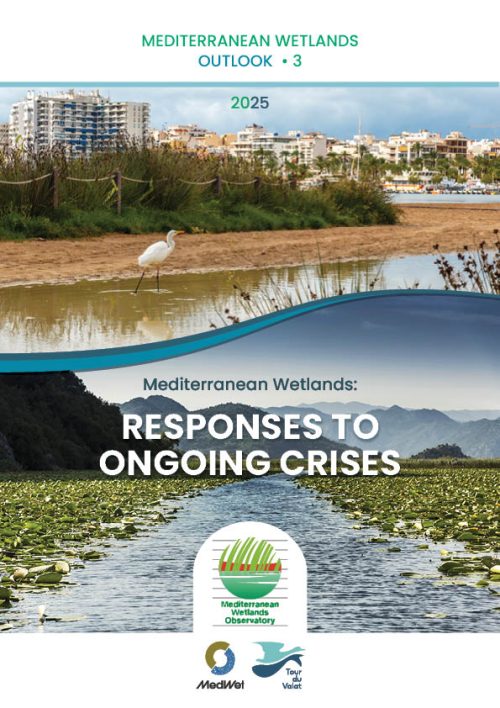
Responses to Ongoing Crises: The Third Edition of the Mediterranean Wetlands Outlook Is Out!
News
Discover the full report of the Mediterranean Wetlands Outlook here!
A Region Under Pressure
The Mediterranean region is facing unprecedented challenges: rapid urbanisation, growing demographic pressure, unsustainable use of water resources, and the escalating impacts of climate change.
In this context, wetlands play a crucial role in regulating water cycles, supporting biodiversity, protecting against floods, and ensuring the well-being of communities.
The Mediterranean Wetlands Outlook 3 (MWO-3), launched during the 15ᵗʰ Conference of the Parties to the Ramsar Convention (Victoria Falls, Zimbabwe, 2025), provides an in-depth assessment of the current state, trends, and responses shaping Mediterranean wetlands.
This flagship publication is developed by the Mediterranean Wetlands Observatory, with the support of numerous scientific and institutional partners.
A Rigorous Regional Assessment
The findings are striking:
- Nearly 56% of historical wetlands have already been lost;
- Natural wetlands have declined by 12% since 1990;
- 95% of major river systems across the region are now fragmented;
- And the ecological status of half of all water bodies remains below good quality standards.
These trends reflect growing pressures from land conversion, agricultural intensification, urban sprawl, water abstraction, and climate change. Together, they threaten ecosystems that provide essential services for both nature and people.
A Solid Analytical Framework for Action
The MWO-3 builds on 18 indicators structured under the DPSIR framework (Drivers – Pressures – State – Impacts – Responses), which helps connect the underlying causes, observed pressures, current conditions, and policy responses.
The analysis covers the 28 countries of the MedWet network, organised into four sub-regions: the Maghreb, the Middle East, the Balkans, and Southern Europe. This integrated approach captures both regional trends and disparities in governance and capacity across the basin.
The report is structured around three complementary components:
- A technical summary, presenting observed trends, key insights from the 18 DPSIR indicators, and the major drivers of change across the basin;
- Recommendations built around five levers for action, offering guidance for policymakers, site managers, and field actors to reconcile development with wetland conservation;
- A series of detailed indicator fact sheets, providing structured results and concise interpretations for each parameter analysed.
Five Levers to Reverse the Trend
One of the key contributions of MWO-3 is the identification of five strategic levers to halt degradation and strengthen the role of wetlands in the ecological transition:
- Rethinking land-use planning, recognising wetlands as essential natural infrastructure;
- Placing water policy at the core of environmental governance;
- Accelerating ecological restoration, with nearly 88,000 km² of potentially restorable areas identified across the region;
- Strengthening governance and regional cooperation, through integrated institutions and partnerships;
- Fostering local engagement and citizen participation, as an essential driver for long-term success.
The Sebou Water Fund: A Concrete Example of Integrated Action
Among the inspiring examples featured in the report is the Sebou Water Fund (Morocco) — an innovative financing mechanism designed to conserve and restore freshwater ecosystems in the Sebou Basin. The project is coordinated by Living Planet Morocco and supported by DIMFE through the project Upscale Sebou Water Fund.
Based on a “payment for ecosystem services” model, the fund brings together public authorities, private companies, and local communities. Downstream water users contribute financially to upstream restoration and land management actions (such as reforestation, erosion control, and sustainable agriculture) which improve water quality, enhance groundwater recharge, and support rural livelihoods.
This approach demonstrates how cross-sector partnerships can successfully link ecological restoration, sustainable financing, and community well-being.
A Call for Collective Action
Beyond diagnosis, the Mediterranean Wetlands Outlook 3 issues a call to collective action. It aims to inform public policy, foster regional cooperation, and inspire joint efforts among governments, researchers, civil society, and local communities to place wetlands at the heart of Mediterranean resilience strategies.
Serving as both a scientific reference and an advocacy tool, the report supports the implementation of international commitments — including the Ramsar Convention on Wetlands and the Kunming-Montreal Global Biodiversity Framework — while promoting integrated approaches that link freshwater, terrestrial, and marine conservation.